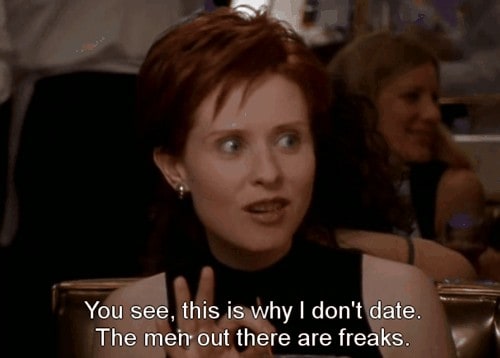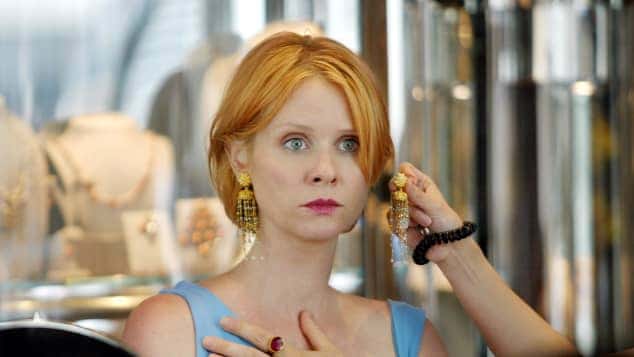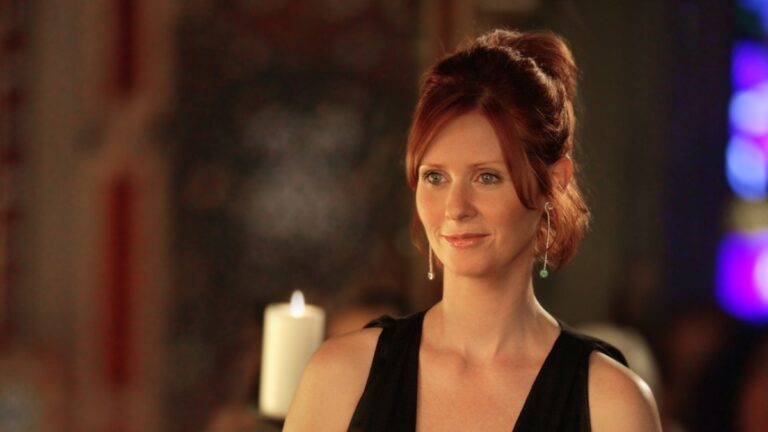“Sexy is how I try them to see me as after I win them over with my personality.”
– Miranda Hobbes
Sex and the City aired in 1998 and was revolutionary in portraying the lives of 30-something women in New York City who were candid about their sex lives and had solid friendships. What Carrie Bradshaw (Sarah Jessica Parker) proclaimed in the pilot season was the main idea of the show itself: “women having sex like men.” It was presenting us with women who were complicated, messy, and human. Yet the only thing that has aged well from the show is Miranda Hobbes, who no one wanted to be in 1998. Lacking diversity in every which way, the show mostly was about cisgender, white women obsessing over men. Miranda calls it out as it is, “ “How does it happen that four such smart women have nothing to talk about but boyfriends?”

Carrie’s relationship with Mr. Big, which was the central romantic storyline, was another problematic and uncomfortable part of the series. Everything about Mr. Big screamed an ego-centric, arrogant, and alpha male. Carrie, for all her writing and self-awareness, never wakes up to this realization. Her reunion with Mr. Big, at the end, makes her look weak, passive, and pretty dumb. But you know who calls it out before all of us realized this toxic relationship? Yes, Miranda! She says to Carrie at one point, “Jesus, every time you get near him you turn into this pathetic, needy, insecure victim and the thing that pisses me off the most is that you are more than willing to go back for more.” Trust Miranda to spill facts.
We could go on and on about the complicated legacy of SATC in 2021, but let us talk about what stays relevant. And it is Miranda Hobbes. The least glamorous of the four friends, she was neither perceived as sexy nor pretty: “I am never going to be a girly girl.” There is nothing wrong with being a “girly girl” but Miranda’s character was considered a killjoy for its least romantic view towards love or relationships. Everyone wanted to be Carrie and no one wanted to be opinionated Miranda. Her friends, like Charlotte (Kristin Davis), were still caught up in the fairytale narratives of the “one.” But not Miranda:
Miranda: Soulmates only exist in the Hallmark aisle in Duane Reade drugs.
Charlotte: I disagree. I believe that there’s that one perfect person out there to complete you.
Miranda: And if you don’t find him, what? You’re incomplete? That’s so dangerous!
Although Miranda is sometimes insecure about her lack of “sexiness” or “pretty looks”, she is rarely apologetic about who she is or what she has achieved: “I want to enjoy my success, not apologize for it.” She buys a new apartment in Manhattan, a big deal, all by and for herself. However, she is met with either taunting, sympathetic, or shocked views on how “tragic” her life must be to not have a man to share the place with. She is quick to note such double standards: “We live in a culture that promotes impossible standards of beauty.” Miranda, obviously, couldn’t bother.

She is not looking for a man to fulfill her needs: “I like my life. I like my job, I like my friends.” And since she does not depend upon men for her emotional needs or “complete” her, Miranda will never accept anyone less than perfect for her. Enjoying her freedom and independence, she is unwilling to compromise or conform to anyone else’s expectations of what her life should look like. And she will also allow no one to make her feel ashamed of it. She makes it clear to her conservative maid Magda, “I drink coffee, have sex, buy pies, and enjoy battery-operated devices.”
Miranda is also very vocal about her desires and is clear about what she wants out of a sexual experience. She is not a people-pleaser because she likes to face facts and spill them. If a boy is not into her, it is not the end of the world for her. She does not take it as a personal attack but is relieved that it saved her “time and therapy.” SATC is a very escapist show which exhibits the lives of Carrie and her friends as some New York adventure. The consumption and materialism are at an all-time high with their designer clothes, limitless shoe shopping, and drinking hundreds of cosmopolitans. Miranda’s realism and knack for sarcasm will always balance such extreme glamour of the show. Whether it is eating cake out of the basket or obsessing over tv shows and the character’s lives, Miranda is very relatable.
She was calling out catcalling and mansplaining before we even had a word for it, as Cynthia Nixon would say in her 2018 article on “Being a Miranda.” Miranda, obviously, had her own flaws. She could be extremely judgemental sometimes which would make her friends shy away from telling her everything. But she was also great at giving advice. Her skepticism over the general idea of love can border on cynicism which would make her see men as never genuine, always seeing the ugly truths. She really put Steve through a whole lot until he was able to convince her that his likeness for her was real. The only people she was not doubtful or cynical about were her friends. She was always there for them and expected the same from them.

Another thing remarkable about the character of Miranda was that she never glamorized motherhood. Rarely feeling like a mother after having her first child, she found motherhood difficult, was disgruntled and exhausted, and was always looking for breaks. This does not mean she did not love her child. Miranda was breaking the general assumption that motherhood is somehow natural and instinctive for women. Miranda was the last person who wanted to settle down like that.
This red-head was abrasive, not afraid to be difficult or unlikeable, and severely (and sometimes ruthlessly) honest. When Samantha (Kim Cattrall) was defending her decision on getting back with Richard (her boyfriend who cheated on her), she explains eagerly that he got scared of their deepening relationship, Miranda quickly retorts: “So what? Do they get a medal for correctly identifying a feeling? We do that all the time.”
Well Miranda, if you put it that way…
